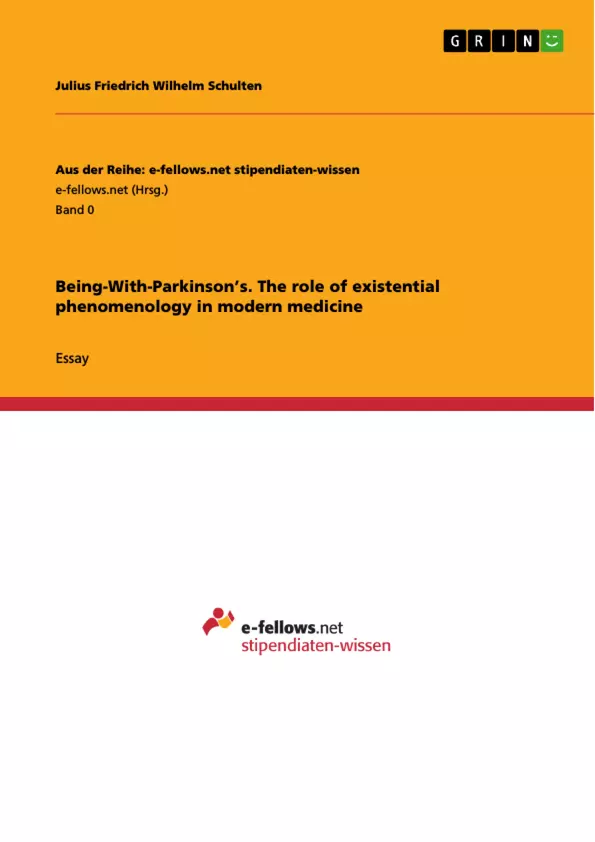Why should the practitioner of internal medicine care if another method, rivalling his state-of-the-art medicine is available? I argue that this is an illusion. If the primary or the internal physician, who see most patients, does not take the time to explore the patient’s being, how could psychiatric disease or even existential suffering be detected? The best method might be a synthesis of modern algorithm- and evidence-based medicine with existential-phenomenological approaches since the physician does not know what ails the patient if there is no insight into his mode of being.
Medicine has a growing interest in existential phenomenology and existential literature has a negatively connotated but nevertheless relevant interest in medicine. As is shown in the case of Ivan Ilych, we should strive to translate the fields into one another to further understanding: what does it mean for an illness to be existential? Great progress has been made to operationalize this concept by the likes of GRECH, MARKS (2017). Now it is time for doctors to pick it up and put it to good use in two ways: first, understand the patients’ existential worries; second, communicate in existential terms, not esoteric pathophysiology.
Inhaltsverzeichnis (Table of Contents)
- Introduction
- Existential phenomenology
- Idiopathic Parkinson's disease
- Research questions and working hypothesis
- Methods
- Analysis of existential literature via Tolstoy: The death of Ivan Ilych
- Analysis of medical literature via Pubmed queries
- Results
- Analysis of existential literature
- Analysis of medical literature
- Discussion
- What is it that constitutes an illness or sickness as existential?
- What factors make Parkinson's disease an existential disease?
- What kind of influence did existential philosophy have on the medical field?
- Conclusion
Zielsetzung und Themenschwerpunkte (Objectives and Key Themes)
This essay explores the existential phenomenology of Parkinson's disease, utilizing current medical research alongside Tolstoy's novella, "The Death of Ivan Ilych." It examines the intersection of existentialist thought and medicine, aiming to understand how medical treatment can influence existential sickness and analyze the impact of existential philosophy on the medical field.
- The nature of existential illness and sickness
- Factors contributing to Parkinson's disease as an existential illness
- Influence of existential philosophy on the medical field, particularly psychiatry, psychoanalysis, and psychosomatic medicine
- Exploring the concept of "being-with-Parkinson's" through a phenomenological lens
- The role of medical treatment in shaping the existential experience of illness
Zusammenfassung der Kapitel (Chapter Summaries)
- Introduction: Provides an overview of existential phenomenology, highlighting its origins, key figures, and influence on the fields of art and medicine. It also introduces the history and current understanding of Idiopathic Parkinson's disease, outlining its symptoms and treatment options.
- Existential phenomenology: Briefly discusses the philosophical movements of Existentialism and Phenomenology, explaining their key tenets and how they converge in "Existential Phenomenology." It emphasizes the practical nature of phenomenology as a descriptive method and the focus on individual experience in Existentialism.
- Idiopathic Parkinson's disease: Traces the history of the disease, highlighting its systematic characterization by James Parkinson and the development of diagnostic criteria. It also discusses the various treatment options, including medication and deep brain stimulation.
- Research questions and working hypothesis: Outlines the core research questions driving the analysis, focusing on the existential nature of illness, factors contributing to Parkinson's disease as an existential illness, and the impact of existential philosophy on medicine. The hypothesis posits that phenomenology has primarily influenced the fields of psychiatry, psychoanalysis, and psychosomatic departments.
- Methods: Introduces the two primary methods of analysis: (1) analyzing Tolstoy's "The Death of Ivan Ilych" to identify points of intersection between existential thought and medicine and (2) examining medical literature through Pubmed queries to assess the impact of existential philosophy on different medical fields.
Schlüsselwörter (Keywords)
The essay revolves around the core concepts of Existential Phenomenology, Idiopathic Parkinson's Disease, and the influence of existential philosophy on the medical field. It explores themes like existential illness, "being-with-Parkinson's," medical treatment, and the existential experience of illness. Key terms include phenomenology, existentialism, Heidegger, Sartre, Tolstoy, "The Death of Ivan Ilych," medical phenomenology, psychiatry, psychoanalysis, and psychosomatic medicine.
- Quote paper
- Julius Friedrich Wilhelm Schulten (Author), 2020, Being-With-Parkinson’s. The role of existential phenomenology in modern medicine, Munich, GRIN Verlag, https://www.hausarbeiten.de/document/1288091


